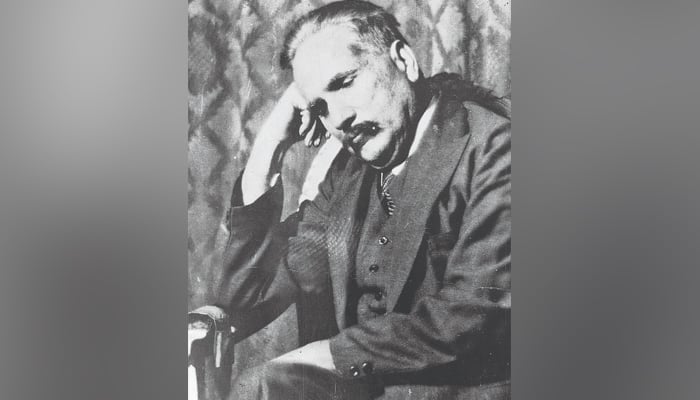‘Iqbal fought fatalist mindset through his poetry’
The decline of Muslims in the Sub-continent was the biggest pain in Allama Iqbal’s soul and the entire corpus of his poetry reflects that. Poet and literary scholar Farasat Rizvi said this while speaking at a discussion on Iqbal at the Arts Council of Pakistan’s library on Thursday evening.
He added that Iqbal considered fatalism one of the biggest reasons for the decline of Muslims in South Asia and believed that if fatalism was accepted, there could be concept of the Day of Judgment.
The speaker went on to say that the Iqbal’s views on art, nation, God and humanity shine through Iqbal's poetry. The idea of Ishq, he said, was the fundamental driving force behind Iqbal's poetry.
Dr Rauf Parekh, Urdu lexicographer, linguist, and humourist, said Iqbal stressed the need for popularising what the Islamic history taught. He said Iqbal used to say that education was what propelled the nations forward.
Iqbal, according to Dr Parekh, was not content with traditional education and nor he was in favour of the Western system of education. He said Iqbal was also against the concept of Western democracy and explained how even Socrates had written that democracy allowed demagogues to become rulers if they succeeded in getting public support through their highly emotional speeches.
Poet Dr Fatima Hasan discussed Iqbal’s poem Masjid-e-Qurtaba that many consider to be his magnum opus. She said Iqbal was fond of Islamic architecture and he had called architecture a hallmark of Muslim civilisation in his preface to the Muraqqa Chughtai.
She said there was a profound impression on Iqbal when he visited the Cordoba Mosque, which led to the creation of his masterpiece poem that dealt with art and its appreciation. "To Iqbal, beauty and truth are the same,” she said. The talk was moderated by poet Rukhsana Saba.
-
 Pentagon Threatens To Cut Ties With Anthropic Over AI Safeguards Dispute
Pentagon Threatens To Cut Ties With Anthropic Over AI Safeguards Dispute -
 Meghan Markle's Father Shares Fresh Health Update
Meghan Markle's Father Shares Fresh Health Update -
 Travis Kelce Takes Hilarious Jab At Taylor Swift In Valentine’s Day Post
Travis Kelce Takes Hilarious Jab At Taylor Swift In Valentine’s Day Post -
 NASA Confirms Arrival Of SpaceX Crew-12 Astronauts At The International Space Station
NASA Confirms Arrival Of SpaceX Crew-12 Astronauts At The International Space Station -
 Can AI Bully Humans? Bot Publicly Criticises Engineer After Code Rejection
Can AI Bully Humans? Bot Publicly Criticises Engineer After Code Rejection -
 Search For Savannah Guthrie’s Abducted Mom Enters Unthinkable Phase
Search For Savannah Guthrie’s Abducted Mom Enters Unthinkable Phase -
 Imagine Dragons Star, Dan Reynolds Recalls 'frustrating' Diagnosis
Imagine Dragons Star, Dan Reynolds Recalls 'frustrating' Diagnosis -
 Steve Jobs Once Called Google Over Single Shade Of Yellow: Here’s Why
Steve Jobs Once Called Google Over Single Shade Of Yellow: Here’s Why -
 Barack Obama Addresses UFO Mystery: Aliens Are ‘real’ But Debunks Area 51 Conspiracy Theories
Barack Obama Addresses UFO Mystery: Aliens Are ‘real’ But Debunks Area 51 Conspiracy Theories -
 Selma Blair Explains Why Multiple Sclerosis 'isn't So Scary'
Selma Blair Explains Why Multiple Sclerosis 'isn't So Scary' -
 Will Smith Surprises Wife Jada Pinkett With Unusual Gift On Valentine's Day
Will Smith Surprises Wife Jada Pinkett With Unusual Gift On Valentine's Day -
 Shamed Andrew Has Paid Royal Favours With ‘national Scandal’
Shamed Andrew Has Paid Royal Favours With ‘national Scandal’ -
 Prince William Ticked Off By How Andrew ‘behaved With Staff’
Prince William Ticked Off By How Andrew ‘behaved With Staff’ -
 Prince William Questions Himself ‘what’s The Point’ After Saudi Trip
Prince William Questions Himself ‘what’s The Point’ After Saudi Trip -
 James Van Der Beek's Friends Helped Fund Ranch Purchase Before His Death At 48
James Van Der Beek's Friends Helped Fund Ranch Purchase Before His Death At 48 -
 King Charles ‘very Much’ Wants Andrew To Testify At US Congress
King Charles ‘very Much’ Wants Andrew To Testify At US Congress




